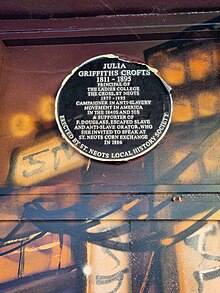Julia Griffiths

Julia Griffiths (21 May 1811 – 1895)[1] was a British abolitionist who worked with the American former slave Frederick Douglass. The two met in London, England, during Douglass's tour of the British Isles in 1845–47. In 1849, Griffiths joined Douglass in Rochester, New York, and edited, published and promoted his work. She was one of six founding members of the influential Rochester Ladies Anti-Slavery Society.[2] She is most noted for publishing Autographs for Freedom,[3] an anthology of anti-slavery literature. In 1854, there were unfounded accusations, leveled by William Lloyd Garrison, that Douglass and Griffiths engaged in infidelity.[4] Griffiths returned to England in 1855, where she continued to organize ladies' anti-slavery societies, write columns for Douglass's newspapers, and raise funds for the Rochester Ladies Anti-Slavery Sewing Society, later called the Rochester Ladies' Anti-Slavery and Freedmen's Aid Society. In 1859, she married Henry O. Crofts, a Methodist minister and former missionary in Canada. After her husband's death, Crofts ran a school for girls in St. Neots.[5]
References
[edit]- ^ National Archives, London, England. 1871 England Census, South Ward, Gateshead, England, p. 41.
- ^ "timeline of Frederick Douglass and family". University at Buffalo. Retrieved 21 May 2020.
- ^ "Autographs for Freedom, Volume 2 (of 2) (1854) by Julia Griffiths". Project Gutenberg. 28 November 2006. Retrieved 21 May 2020.
- ^ Martin, Waldo E. Jr. (2000). The Mind of Frederick Douglass. Univ of North Carolina Press. p. 42. ISBN 978-0-8078-6428-9.
- ^ Palmer, Erwin (1970). "A Partnership in the Abolition Movement". University of Rochester Library Bulletin. 26 (1).
Further reading
[edit]- Fee, Frank E. (Spring 2011). "To No One More Indebted". Journalism History. 37 (1): 12–26. doi:10.1080/00947679.2011.12062840. ISSN 0094-7679. S2CID 142950375.
- Fritz, Meaghan M.; Fee, Frank E. (2013). "To Give the Gift of Freedom: Gift Books and the War on Slavery". American Periodicals: A Journal of History, Criticism, and Bibliography. 23 (1): 60–82. doi:10.1353/amp.2013.0000. ISSN 1548-4238. S2CID 143564528.
External links
[edit] Media related to Julia Griffiths at Wikimedia Commons
Media related to Julia Griffiths at Wikimedia Commons- Works by Julia Griffiths at Project Gutenberg
- Works by or about Julia Griffiths at the Internet Archive
- Rochester Ladies' Anti-Slavery Society Papers at the William L. Clements Library
